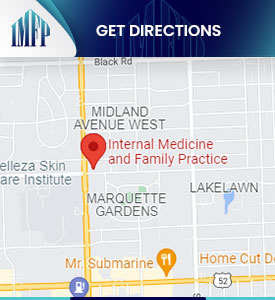Best Doctors for the Elderly in Joliet, IL
Receive compassionate and specialized care for seniors in Joliet, IL. Our experienced doctors, Dr. Wael Mctabi, MD, and Dr. Samiullah Choudry, provide personalized healthcare tailored to the unique needs of elderly patients at Internal Medicine and Family Practice. For more information, please contact us or schedule an appointment online! We are conveniently located at 1719 Glenwood Ave Joliet, IL 60435.


Table of Contents:
At What Age Should You Start Seeing a Doctor for the Elderly?
What Are the Most Common Health Issues That Doctors for the Elderly Treat?
How Often Should Elderly Patients See Their Doctor?
What Should You Bring to a Geriatric Doctor’s Appointment?
As individuals age, maintaining regular medical care becomes increasingly vital to address the unique health challenges associated with aging. Establishing a relationship with a healthcare provider who understands the complexities of aging is essential for optimizing health and well-being.
While there is no universally agreed-upon age to initiate geriatric-specific care, many healthcare professionals recommend increased engagement with healthcare providers around the age of 65. This often coincides with eligibility for Medicare in the United States, which encourages regular health assessments. However, the decision to transition into more focused geriatric care should be personalized, taking into account factors such as overall health, family history, chronic conditions, and functional status.
Internal Medicine and Family Practice physicians integrate geriatric care principles to provide comprehensive, patient-centered care for older adults. They conduct thorough health assessments, incorporating cognitive screening and functional evaluations to identify and address potential health issues proactively. Preventive care and early detection are key focuses, with providers monitoring cardiovascular health, screening for cognitive changes, and assessing bone density to prevent age-related conditions like heart disease, dementia, and osteoporosis.
These providers excel in managing chronic conditions common among older adults, such as diabetes, hypertension, and arthritis, using a holistic and coordinated approach tailored to each patient’s needs. By evaluating mobility, balance, and cognitive function, they develop strategies to support functional independence and improve quality of life. Serving as the primary point of contact, our physicians coordinate care and provide referrals to specialists, including geriatricians, when necessary. This ensures cohesive, comprehensive care that prioritizes the unique needs of elderly patients.
Open communication between patients and healthcare providers is essential in determining the right time to transition to more focused immediate care. Discussions should consider cognitive health, mobility, and the ability to perform daily activities independently. By integrating geriatric care principles within Internal Medicine and Family Practice, providers can help monitor health, prevent disease progression, and promote overall well-being as patients age. Consulting with healthcare professionals allows for personalized care plans that align with each individual’s needs and circumstances.
Dr. Wael Mctabi, MD, provides comprehensive care for older adults, managing chronic, age-related, and acute conditions to enhance quality of life.
Chronic Conditions: They develop personalized treatment plans for arthritis, using medications, physical exams, and lifestyle changes to improve mobility and reduce pain. For cardiovascular diseases like hypertension and heart failure, they collaborate with cardiologists to optimize care. Diabetes management involves careful monitoring of blood sugar and addressing complications like neuropathy. Dementia care includes coordination with specialists, focusing on cognitive function and caregiver support. Fall prevention strategies involve balance training, home safety assessments, and medication reviews.
Age-Related Conditions: Physicians prioritize bone health by treating osteoporosis with preventive measures and therapies to maintain bone density. Incontinence is addressed through evaluations, lifestyle modifications, or specialist referrals. Frailty is managed by promoting physical activity, nutrition, and social engagement. Regular medication reviews prevent adverse drug interactions and address polypharmacy. Mental health concerns, such as depression and anxiety, are also treated to ensure emotional well-being.
Acute Conditions: Prompt diagnosis and treatment of infections, such as respiratory or urinary tract infections, are critical for preventing complications. Respiratory issues like COPD are managed with interventions to maintain lung function. Cancer screenings and early detection strategies are emphasized, along with personalized treatments for diagnosed patients. End-of-life care is guided with compassion, offering support to patients and families during this time.
Additionally, addressing sensory impairments is vital in maintaining communication and social interaction. Regular screenings for vision and hearing loss, along with appropriate interventions, are crucial components of care.
Regular check-ups with Internal Medicine and Family Practice physicians are essential for elderly individuals to manage chronic conditions, address acute issues, and maintain overall well-being. Through a patient-centered approach, these practitioners ensure that older adults receive comprehensive and compassionate care tailored to their specific needs.
For elderly patients with chronic conditions such as diabetes, hypertension, heart disease, or arthritis, more frequent visits may be necessary. Our practice works collaboratively with patients to determine an appropriate schedule tailored to the specific condition and its severity, ensuring close monitoring and effective management of their health.
In addition to regular check-ups, we encourage our elderly patients to seek medical attention promptly if they experience new or worsening symptoms, such as chest pain, shortness of breath, dizziness, confusion, or falls. Preventive care is a cornerstone of our practice, and we emphasize the importance of screenings for cancers, vaccinations, and assessments for cognitive and physical function, which may require separate appointments.
At our practice, we prioritize establishing strong relationships with our patients. Having a dedicated primary care physician ensures continuity of care and effective coordination of medical services. We believe open communication is essential; it allows us to personalize care schedules, address concerns proactively, and support our patients in maintaining their health, independence, and quality of life. Let us partner with you in your healthcare journey to provide comprehensive and compassionate care tailored to your needs.
Here’s a guide tailored to your needs:
To prepare for your medical appointment, bring key documentation for a smooth and productive visit.
Medical History: Include a list of current and past medical conditions, recent test results (e.g., blood work, imaging), immunization records, and summaries of recent hospital visits or discharges.
Medication Information: Provide a detailed list of all medications, including prescriptions, over-the-counter drugs, vitamins, and supplements, along with their dosages and frequency.
Personal and Administrative Details: Bring identification, your health insurance card, and any necessary referrals. Include contact information for family members or caregivers and, if available, advance directives like a living will or power of attorney for healthcare. Verify your insurance information to avoid coverage or billing issues.
Symptom and Concern Documentation: Prepare a written account of your symptoms, including onset, frequency, and factors influencing them. Note changes in appetite, sleep, pain, or memory. Create a list of questions or topics to discuss, such as treatment options or lifestyle changes, to ensure no details are missed.
Practical Considerations: Bring water, snacks, and note-taking materials for lengthy appointments. Consider bringing a family member or caregiver for support and additional insights.
Physical Exam and Cognitive Tools: Wear comfortable clothing, and bring assistive devices like canes or glasses. For cognitive assessments, share relevant screening results or activities with your doctor. These steps ensure a thorough and efficient medical visit.
Discover top-notch healthcare for seniors at Internal Medicine and Family Practice in Joliet, IL. With Dr. Wael Mctabi, MD, and Dr. Samiullah Choudry, you’ll receive expert care designed to meet the unique needs of elderly patients. Ensure the best care for your loved ones today.
Dr. Wael Mctabi, MD, and Dr. Samiullah Choudry specialize in providing attentive, personalized care for elderly patients in Joliet, IL. Through geriatric medicine at Internal Medicine and Family Practice, they address the unique needs of aging adults—from medication management and mobility support to preventive health planning. Their patient-first approach ensures seniors maintain a high quality of life and independence as they age.
For more information, please contact us or schedule an appointment online. We are conveniently located at 1719 Glenwood Ave Joliet, IL 60435. We welcome walk-ins. We serve patients from Joliet IL, Plainfield IL, Lockport IL, Channahon IL, Romeoville IL, Manhattan IL and surrounding areas
Check Out Our 5 Star Reviews








